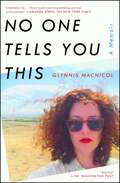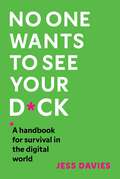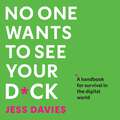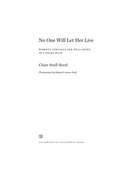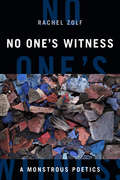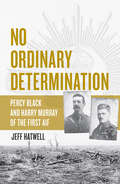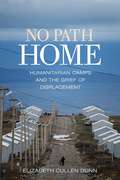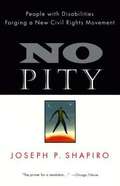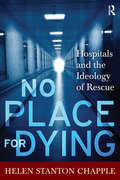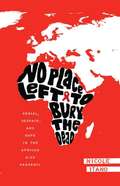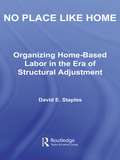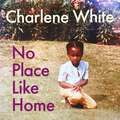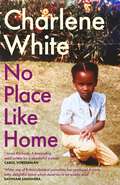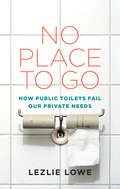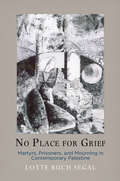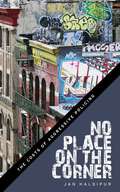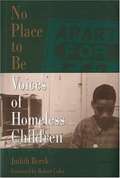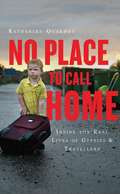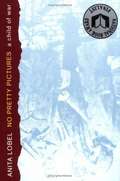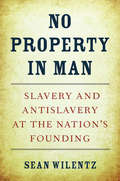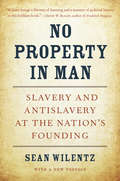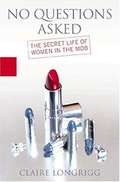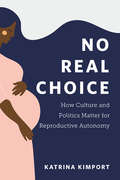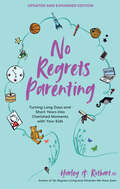- Table View
- List View
No One Tells You This: A Memoir
by Glynnis MacNicolSelected as one of BuzzFeed’s “Exciting Summer Books” Featured in Goop's “15 Books We’re Reading This Summer” Selected as one of Vogue’s “13 Books to Thrill, Entertain, and Sustain You This Summer” Selected as one of Bustle's “15 Best Nonfiction Books Coming Out In July 2018” If the story doesn’t end with marriage or a child, what then?This question plagued Glynnis MacNicol on the eve of her 40th birthday. Despite a successful career as a writer, and an exciting life in New York City, Glynnis was constantly reminded she had neither of the things the world expected of a woman her age: a partner or a baby. She knew she was supposed to feel bad about this. After all, single women and those without children are often seen as objects of pity, relegated to the sidelines, or indulgent spoiled creatures who think only of themselves. Glynnis refused to be cast into either of those roles and yet the question remained: What now? There was no good blueprint for how to be a woman alone in the world. She concluded it was time to create one. Over the course of her fortieth year, which this memoir chronicles, Glynnis embarks on a revealing journey of self-discovery that continually contradicts everything she’d been led to expect. Through the trials of family illness and turmoil, and the thrills of far-flung travel and adventures with men, young and old (and sometimes wearing cowboy hats), she is forced to wrestle with her biggest hopes and fears about love, death, sex, friendship, and loneliness. In doing so, she discovers that holding the power to determine her own fate requires a resilience and courage that no one talks about, and is more rewarding than anyone imagines. Intimate and timely, No One Tells You This is a fearless reckoning with modern womanhood and an exhilarating adventure that will resonate with anyone determined to live by their own rules.
No One Wants to See Your D*ck: A Handbook for Survival in the Digital World
by Jess DaviesAre women asking for it because of their outfits, routes home, profile pictures or social media posts? Or we can we finally admit that there might be something wrong with masculinity in the digital world?The rising popularity of misogynistic content and toxic masculinity influencers combined with a lack of regulation within social media has created a perfect storm. Our increasingly online world has opened women and young girls up to a whole new level of violence that follows them into their homes, schools and workplaces.In No One Wants to See Your D*ck women's rights campaigner Jess Davies reveals the shocking realities of this epidemic and what we can do to stop it. Covering everything from cyberflashing and deepfakes to the manosphere and catfishing, Jess offers practical advice and accessible language to help you understand what is happening online, what to do if you become a victim of it and why drastic change is needed now. Urgent and eye-opening, this is a vital toolkit for understanding and putting an end to violence against women.
No One Wants to See Your D*ck: A Handbook for Survival in the Digital World
by Jess DaviesAre women asking for it because of their outfits, routes home, profile pictures or social media posts? Or we can we finally admit that there might be something wrong with masculinity in the digital world?The rising popularity of misogynistic content and toxic masculinity influencers combined with a lack of regulation within social media has created a perfect storm. Our increasingly online world has opened women and young girls up to a whole new level of violence that follows them into their homes, schools and workplaces.In No One Wants to See Your D*ck, women's rights campaigner Jess Davies reveals the shocking realities of this epidemic and what we can do to stop it. Covering everything from cyberflashing and deepfakes to the manosphere and catfishing, Jess offers practical advice and accessible language to help you understand what is happening online, what to do if you become a victim of it and why drastic change is needed now. Urgent and eye-opening, this is a vital toolkit for understanding and putting an end to violence against women.
No One Will Let Her Live
by Claire Snell-RoodThe inequalities that structure relationships in Delhi's urban slums have left the health of women living there chronically vulnerable. Yet for women living in slums, there is no other option than to depend on someone. Based on fourteen months of intensive fieldwork with ten families in a Delhi slum, No One Will Let Her Live argues that women rely on moral strategies to confront the poverty and unstable relationships that threaten their well-being. Claire Snell-Rood breaks new ground by delineating the complex ways in which women set boundaries, maintain their independence, and develop a nuanced sense of selfhood that draws on endurance, asceticism, mobility, and citizenship.
No One's Witness: A Monstrous Poetics (Black Outdoors: Innovations in the Poetics of Study)
by Rachel ZolfIn No One's Witness Rachel Zolf activates the last three lines of a poem by Jewish Nazi holocaust survivor Paul Celan—“No one / bears witness for the / witness”—to theorize the poetics and im/possibility of witnessing. Drawing on black studies, continental philosophy, queer theory, experimental poetics, and work by several writers and artists, Zolf asks what it means to witness from the excessive, incalculable position of No One. In a fragmentary and recursive style that enacts the monstrous speech it pursues, No One's Witness demonstrates the necessity of confronting the Nazi holocaust in relation to transatlantic slavery and its afterlives. Thinking along with black feminist theory's notions of entangled swarm, field, plenum, chorus, No One's Witness interrogates the limits and thresholds of witnessing, its dangerous perhaps. No One operates outside the bounds of the sovereign individual, hauntologically informed by the fleshly no-thingness that has been historically ascribed to blackness and that blackness enacts within, apposite to, and beyond the No One. No One bears witness to becomings beyond comprehension, making and unmaking monstrous forms of entangled future anterior life.
No Ordinary Determination: Percy Black and Harry Murray of the First AIF
by Jeff HatwellAn epic tale of two ordinary individuals thrown into theextraordinary and surreal world of the Gallipoli campaignas soldiers of the First AIF in WWI.Percy Black and Harry Murray were plain hard-workingAustralians whose paths crossed in Western Australiawhen they enlisted in support of country and empire. Thepowerful narrative paints a complex and thorough pictureof the heroism, loyalty, inventiveness, mateship, stoicismand strength of the many individuals, on all sides, caughtup in the horror of the ‘war to end all wars’.
No Path Home: Humanitarian Camps and the Grief of Displacement
by Elizabeth Cullen DunnFor more than 60 million displaced people around the world, humanitarian aid has become a chronic condition. No Path Home describes its symptoms in detail. Elizabeth Cullen Dunn shows how war creates a deeply damaged world in which the structures that allow people to occupy social roles, constitute economic value, preserve bodily integrity, and engage in meaningful daily practice have been blown apart. After the Georgian war with Russia in 2008, Dunn spent sixteen months immersed in the everyday lives of the 28,000 people placed in thirty-six resettlement camps by official and nongovernmental organizations acting in concert with the Georgian government. She reached the conclusion that the humanitarian condition poses a survival problem that is not only biological but also existential. In No Path Home, she paints a moving picture of the ways in which humanitarianism leaves displaced people in limbo, neither in a state of emergency nor able to act as normal citizens in the country where they reside.
No Pity: People with Disabilities Forging a New Civil Rights Movement
by Joseph P. ShapiroPeople with disabilities forging the newest and last human rights movement of the century.
No Place For Dying: Hospitals and the Ideology of Rescue
by Helen Stanton ChappleThe U.S. hospital embodies society’s hope for itself—a technological bastion standing between us and death. What does the gold standard of rescue, as ideology and industry, mean for the dying patient in the hospital and for the status of dying in American culture? This book shows how dying is a management problem for hospitals, occupying space but few billable encounters and of little interest to medical practice or quality control. An anthropologist and bioethicist with two decades of professional nursing experience, Helen Chapple goes beyond current work on hospital care to present fine-grained accounts of the clinicians, patients, and families who navigate this uncharted, untidy, and unpredictable territory between the highly choreographed project of rescue and the clinical culmination of death. This book and its important social and policy implications make key contributions to the social science of medicine, nursing, hospital administration, and health care delivery fields.
No Place Left to Bury the Dead
by Nicole ItanoEVERY DAY in Africa, approximately 7,000 men, women, and children are erased from the face of this planet by the devastating AIDS virus that -- even after more than two and a half decades -- continues to wreak havoc around the globe, especially in underdeveloped nations. No Place Left to Bury the Dead dares to go where media, governments, and ordinary individuals in the West seldom venture -- face-to-face with fellow humans suffering in the shadow of our collective ignorance and neglect. In this haunting investigation, acclaimed journalist Nicole Itano goes beyond traditional journalistic methods as she eats, sleeps, and lives with the women who struggle daily with the raging epidemic of AIDS. Working from the personal accounts of a few real women living with the disease, Itano traces their moments of discovery and diagnosis, their first symptoms, and the ways they cope with treatment and manage the news with their families. Itano's masterful blend of the personal, scientific, and historical turns statistics into stories and balances tragedy with hope as she outlines the scope of new treatment and prevention. In a time when celebrity and political heavy hitters such as Bono and Bill Clinton are rushing to find a remedy for Africa's increasing problem, No Place Left to Bury the Dead shows the world how the transformation of a few courageous women can heal entire communities and eradicate denial, and how books like these increase global awareness of one of the worst epidemics in human history. Like And the Band Played On and The Coming Plague, this book is a wake-up call that is urgently needed.
No Place Like Home: Organizing Home-Based Labor in the Era of Structural Adjustment (New Approaches in Sociology)
by David StaplesNo Place Like Home examines the emergence of home-based women workers as paradigmatic figures of contemporary capitalism, neoliberal governmentality, and socio-political contestation. Far from an isolated or contingent situation, home-based work constitutes today an enormous arena of 'invisible' social and political struggles of subaltern and ethno-racially subordinated women.
No Place Like Home: ‘A universal message … Warm, witty and delightful’ SATHNAM SANGHERA
by Charlene White'White, one of Britain's boldest journalists, has produced a warm, witty, delightful memoir which deserves to be widely read' Sathnam Sanghera, author of Empireland'I loved this book. A fascinating read written by a wonderful woman' Carol Vorderman'To feel as though you belong and knowing who you are are both the most important necessities of life and essential to one's wellbeing. This historic, inspirational book demonstrates that' Baroness Floella Benjamin, OM DBEHome is a vital base for us to thrive, yet, for some, the question of where home is isn't as simple as an address.Depending on circumstance, 'home' may not simply be where we rest, eat and sleep. With the concept of home comes questions of ancestry, identity and belonging, and the understanding that there is no one fixed idea of what or where home is.In No Place Like Home, Charlene White boldly shares her own story and understanding of home as a Jamaican Londoner exploring all the smells, memories and voices from her childhood. Alongside her personal story, White interviews eight individuals who give their perspectives on home and their experiences that are shaped by myriad events from difficult family situations to desperate political upheaval and war. No Place Like Home is a powerful and heartfelt exploration of family, food and finding your place, as well as the moments in history that have changed the way we feel about the simplest of terms: 'home'.
No Place Like Home: ‘A universal message … Warm, witty and delightful’ SATHNAM SANGHERA
by Charlene White'White, one of Britain's boldest journalists, has produced a warm, witty, delightful memoir which deserves to be widely read' Sathnam Sanghera, author of Empireland'I loved this book. A fascinating read written by a wonderful woman' Carol Vorderman'To feel as though you belong and knowing who you are are both the most important necessities of life and essential to one's wellbeing. This historic, inspirational book demonstrates that' Baroness Floella Benjamin, OM DBEHome is a vital base for us to thrive, yet, for some, the question of where home is isn't as simple as an address.Depending on circumstance, 'home' may not simply be where we rest, eat and sleep. With the concept of home comes questions of ancestry, identity and belonging, and the understanding that there is no one fixed idea of what or where home is.In No Place Like Home, Charlene White boldly shares her own story and understanding of home as a Jamaican Londoner exploring all the smells, memories and voices from her childhood. Alongside her personal story, White interviews eight individuals who give their perspectives on home and their experiences that are shaped by myriad events from difficult family situations to desperate political upheaval and war. No Place Like Home is a powerful and heartfelt exploration of family, food and finding your place, as well as the moments in history that have changed the way we feel about the simplest of terms: 'home'.
No Place To Go: How Public Toilets Fail Our Private Neds
by Lezlie LoweFrom pay potties to deserted alleyways, and in cities from London to San Francisco to Toronto, No Place To Go talks about where we go in public. It’s a marriage of urbanism, social narrative, and pop culture that shows the ways -- momentous and mockable -- public bathrooms just don't work. Like, for the homeless who, faced with no place to go literally take to the streets. (Ever heard of a municipal poop map?) For people with invisible disabilities, such as Crohn’s disease, who stay home rather than risk soiling themselves on public transit. For girls who quit sports teams because they don’t want to run to the edge of the pitch to pee. Bathroom bills that will stomp on the rights of trans people dominate the news. And where was Hillary Clinton before she arrived back to the stage late after a commercial break during the live Democratic leadership debate in December 2015? Stuck in a queue for the women’s toilet.Peel back the layers on public bathrooms and it's clear many more people want for good access than have it. Public bathroom access is about cities, society, design, movement, and equity. The real question is: Why are public toilets so crappy?
No Place for Grief: Martyrs, Prisoners, and Mourning in Contemporary Palestine (The Ethnography of Political Violence)
by Lotte Buch SegalWesterners 'know' Palestine through images of war and people in immediate distress. Yet this focus has as its consequence that other, less spectacular stories of daily distress are rarely told. Those seldom noticed are the women behind the men who engage in armed resistance against the military occupation: wives of the Palestinian prisoners in Israeli detention and the widows of the martyrs. In Palestine, being related to a detainee serving a sentence for participation in the resistance activities against Israel is a source of pride. Consequently, the wives of detainees are expected to sustain these relationships through steadfast endurance, no matter the effects upon the marriage or family. Often people, media, and academic studies address the dramatic violence and direct affliction of the Palestinians. Lotte Buch Segal takes a different approach, and offers a glimpse of the lives, and the contradictory emotions, of the families of both detainees and martyrs through an in-depth ethnographic investigation.No Place for Grief asks us to think about what it means to grieve when that which is grieved does not lend itself to a language of loss and mourning. What does it mean to "endure" when ordinary life is engulfed by the emotional labor required to withstand the pressures placed on Palestinian families by sustained imprisonment and bereavement? Despite an elaborate repertoire of narrative styles, laments, poetry, and performance of bodily gestures through which mourning can be articulated, including the mourning tied to a political cause, Buch Segal contends that these forms of expression are inadequate to the sorrow endured by detainees' wives. No Place for Grief reveals a new language that describes the entanglement of absence and intimacy, endurance and everyday life, and advances an understanding of loss, mourning, and grief in contemporary Palestine.
No Place on the Corner: The Costs of Aggressive Policing
by Jan HaldipurWinner, 2019 Goddard Riverside Stephan Russo Book Prize for Social Justice, given by the Goddard Riverside Community CenterThe impact of stop-and-frisk policing on a South Bronx community What’s it like to be stopped and frisked by the police while walking home from the supermarket with your young children? How does it feel to receive a phone call from your fourteen-year-old son who is in the back of a squad car because he laughed at a police officer? How does a young person of color cope with being frisked several times a week since the age of 15? These are just some of the stories in No Place on the Corner, which draws on three years of intensive ethnographic fieldwork in the South Bronx before and after the landmark 2013 Floyd v. City of New York decision that ruled that the NYPD’s controversial “stop and frisk” policing methods were a violation of rights. Through riveting interviews and with a humane eye, Jan Haldipur shows how a community endured this aggressive policing regime. Though the police mostly targeted younger men of color, Haldipur focuses on how everyone in the neighborhood—mothers, fathers, grandparents, brothers and sisters, even the district attorney’s office—was affected by this intense policing regime and thus shows how this South Bronx community as a whole experienced this collective form of punishment. One of Haldipur’s key insights is to demonstrate how police patrols effectively cleared the streets of residents and made public spaces feel off-limits or inaccessible to the people who lived there. In this way community members lost the very ‘street corner’ culture that has been a hallmark of urban spaces. This profound social consequence of aggressive policing effectively keeps neighbors out of one another’s lives and deeply hurts a community’s sense of cohesion. No Place on the Corner makes it hard to ignore the widespread consequences of aggressive policing tactics in major cities across the United States.
No Place to Be: Voices of Homeless Children
by Judith BerckThe stories and poems of actual homeless children--including fourteen-year-old Kareem, who lives in a city shelter -- depict the reality of homelessness in America, illustrating what it means to be deprived of the things most people take for granted.
No Place to Call Home: Inside the Real Lives of Gypsies and Travellers
by Katharine QuarmbyThey are reviled. For centuries the Roma have wandered Europe; during the Holocaust half a million were killed. After World War II and during the Troubles, a wave of Irish Travellers moved to England to build a better, safer life. They found places to settle down--but then, as Occupy was taking over Wall Street and London, the vocal Dale Farm community was evicted from their land. Many did not leave their homes quietly; they put up a legal--and at times physical--fight.Katharine Quarmby, an award-winning journalist who has reported on Gypsies and Travellers in The Economist for the past seven years, takes us into the heat of the battle, following the Sheridan, McCarthy, Burton and Townsley families before and after the eviction, from Dale Farm to Meriden, in the heart of England, and other trouble spots. Based on exclusive access and rich historical research, No Place to Call Home is a deeply moving and stunning narrative of long-sought justice.
No Place to Cry: The Hurt and Healing of Sexual Abuse
by Erwin W. Lutzer Doris VanstoneJeremiah knew that healing was possible. God's name is Jehovah Rapha, which means the God who heals, and God has a balm, a healing salve--His Word. That's why Jeremiah was dismayed. He knew that there was no wound or hurt so great, so horrible, so seemingly destructive that our sovereign God could not heal it. He is God, the God of all flesh, and nothing is too hard for Him. If there is any story that will illustrate this truth, you will find it within the covers of No Place to Cry.
No Pretty Pictures: A Child of War
by Anita LobelA finalist for the National Book Award, Lobel's unforgettable memoir paints a disturbing picture of a child hiding from the Nazis in World War II. Since coming to the United States as a teenager, Lobel has spent her life as an author and illustrator of picture books.
No Property in Man: Slavery and Antislavery at the Nation's Founding (The Nathan I. Huggins lectures #18)
by Sean WilentzDriving straight to the heart of the most contentious issue in American history, Sean Wilentz argues controversially that, far from concealing a crime against humanity, the U.S. Constitution limited slavery’s legitimacy—a limitation which in time inspired the antislavery politics that led to Southern secession, the Civil War, and Emancipation.
No Property in Man: Slavery and Antislavery at the Nation’s Founding, With a New Preface (The Nathan I. Huggins Lectures #18)
by Sean WilentzDriving straight to the heart of the most contentious issue in American history, Sean Wilentz argues controversially that, far from concealing a crime against humanity, the U.S. Constitution limited slavery’s legitimacy—a limitation which in time inspired the antislavery politics that led to Southern secession, the Civil War, and Emancipation.
No Questions Asked: The Secret Life of Women in the Mob
by Clare LongriggCarmela Soprano has set the gold standard for our image of the American mob woman: a loyal materfamilias devoted to her family and her church, not to mention her exquisite Italian cooking. But beyond the teased-out hair and frosted nails, she is smart, savvy, and, at times, morally conflicted about her role in her husbands world. gets to the heart of this complex existence in No Questions Asked, an investigation of the real women in today's American Mafia. Longrigg delved into the hidden depths of the American mob society and discovered a subculture of powerful women in the midst of the Mafia patriarchy. From New Jersey to Chicago, Miami to LA, she interviewed the wives, mothers, daughters, and mistresses of "made men" to find out how they functioned in this deadly underworld. Some are irresistibly attracted to dangerous men-like Camille Serpico, who married her first husband's killer, and Lana Zancocchio, daughter of the reputed Bonanno family consigliere, who calls her terrifying father a "real man." Others, like Brenda Colletti, take part in criminal activities alongside their men, covering up for them with the police and plotting mob hits. And there are those who rebel, like Betty Tocco: to save her son from a life of crime, she conspired with the Feds to send her mob boss of a husband to jail for two hundred years. Longrigg profiles this fascinating cast of characters and their sacrifices, as well as their own uses and abuses of power. Looking at the women born into the Family and those who are inexplicably attracted to it, Longrigg portrays their struggles with identity, self-confidence, and conscience. Based on her unique access to the women behind the Mafia, and the first unprecedented glimpse into a fierce private, lethally complicated world. CLARE LONGRIGG is the author of Mafia Women an expose of women in the Mafia in Italy, writes for the Independent and the Guard in London, where she lives.
No Real Choice: How Culture and Politics Matter for Reproductive Autonomy (Families in Focus)
by Katrina KimportIn the United States, the “right to choose” an abortion is the law of the land. But what if a woman continues her pregnancy because she didn’t really have a choice? What if state laws, federal policies, stigma, and a host of other obstacles push that choice out of her reach? Based on candid, in-depth interviews with women who considered but did not obtain an abortion, No Real Choice punctures the myth that American women have full autonomy over their reproductive choices. Focusing on the experiences of a predominantly Black and low-income group of women, sociologist Katrina Kimport finds that structural, cultural, and experiential factors can make choosing abortion impossible–especially for those who experience racism and class discrimination. From these conversations, we see the obstacles to “choice” these women face, such as bans on public insurance coverage of abortion and rampant antiabortion claims that abortion is harmful. Kimport's interviews reveal that even as activists fight to preserve Roe v. Wade, class and racial disparities have already curtailed many women’s freedom of choice. No Real Choice analyzes both the structural obstacles to abortion and the cultural ideologies that try to persuade women not to choose abortion. Told with care and sensitivity, No Real Choice gives voice to women whose experiences are often overlooked in debates on abortion, illustrating how real reproductive choice is denied, for whom, and at what cost.
No Regrets Parenting: Turning Long Days and Short Years into Cherished Moments with Your Kids
by Harley A. Rotbart&“A busy parent&’s time management guide, demonstrating how to find balance . . . and transform everyday routines into special times.&” —Publishers Weekly No Regrets Parenting focuses on the simple truth that the long days of busy parenting race quickly by and, looking back someday, the years with kids will feel far too short. Written by renowned pediatrician and distinguished parenting expert, Dr. Harley Rotbart, No Regrets Parenting teaches parents how to experience the joy of raising kids amidst the chaos of daily routines. Carpool, bedtime, bath time, soccer practice, homework, dinner hour, and sleepovers all become more than just hurdles to overcome. They become opportunities for intimate and meaningful time with kids— opportunities to turn fleeting minutes into memorable moments. With up to date content addressing the needs of today&’s busy families as well as two brand new sections –one on parenting adult children and another on grandparenting--this updated and expanded edition answers the ageless question: How can you do it all…and stay sane in the process? &“No Regrets Parenting is something special, and something a little different. Dr. Rothbart writes to help us turn painfully long minutes into funny moments. . . . It&’s more about being a parent than it is about actually parenting the kids themselves.&” —New York Times &“A gem of a book.&” —Harvey Karp, MD, creator of the New York Times bestselling books and DVDs The Happiest Baby on the Block and The Happiest Toddler on the Block &“Working parent or stay-at-home mom or dad, Dr. Rotbart&’s wise advice and refreshing ideas will make you want to pick up this book again and again.&” —Parents magazine
